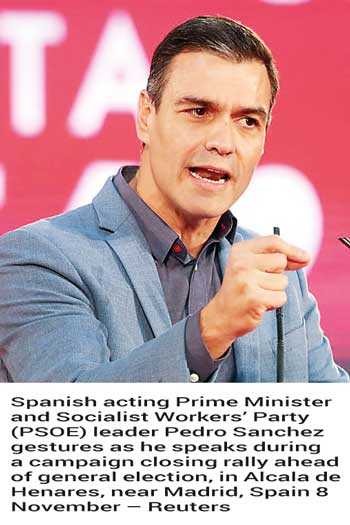Saturday Feb 28, 2026
Saturday Feb 28, 2026
Tuesday, 12 November 2019 00:00 - - {{hitsCtrl.values.hits}}
MADRID (Reuters): Spain’s acting prime minister, Socialist leader Pedro Sanchez, faced the prospect of hard bargaining to form a government on Monday after his gamble on holding Spain’s second election this year resulted in no clear winner but a surge for the far right.
A polarised electorate awarded neither right nor left-wing parties enough seats to govern with a majority although the Socialists won most seats. 
“Forming a government looked complicated in April, now it’s an inscrutable hieroglyph,” El Pais newspaper wrote.
The power balance between the traditional ideological blocs changed little since the last election in April but the breakdown of votes within conservative parties shifted substantially.
Sanchez’s Socialist Workers’ Party of Spain (PSOE) won 120 of the 350 parliamentary seats – three less than in April.
The conservative People’s Party, which alternated in government with the Socialists for decades after Spain emerged from General Francisco Franco’s dictatorship in the 1970s, recovered from a disappointing result in April to take 88 seats, gaining 22.
But the centre-right Ciudadanos slumped from 57 seats to just 10 and was replaced as the country’s third-largest parliamentary group by the far-right Vox, a relative newcomer, which secured 52 seats.
Joining a nationalist wave in other parts of Europe, Vox’s anti-immigrant stance and particularly vehement opposition to a secessionist drive in Catalonia become the first far-right party with more than one seat since Spain returned to democracy. Far-left Unidas Podemos, which tried and failed to reach a coalition deal with Sanchez after the last election, lost seven seats to take fourth place with 35 seats.
Podemos leader Pablo Iglesias said he was ready to start negotiating with Sanchez on Monday and urged the left to unite this time.
With many Spaniards still remembering the Franco years, the country had long appeared immune to right-wing nationalism. But Vox leader Santiago Abascal said he would now work to build what he called “a patriotic alternative” for Spain.
This was Spain’s fourth election in four years. In the past decade the country has suffered from austerity and near financial collapse, and saw a PP government ousted over a corruption scandal.
But this time the Catalan independence drive, which has turned violent following the jailing of separatist leaders in October, was at the forefront of voters’ minds.